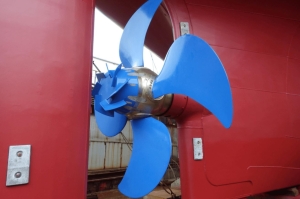


(Posted on 22/02/24)
A revolutionary propeller hub vortex cavitation-eliminating boss cap has successfully completed validation tests at a hydrodynamic research centre in Sweden and will now undergo ship model basin trials to verify the efficiency gains on larger commercial and naval vessels.
Initial computational fluid dynamic (CFD) tests based a typical twin-screw vessel with V-brackets and a 90m coastal general cargo ship showed that EcoMarine Innovations’ Holy Boss Cap (HBC) – named thus to indicate the holes bored into the conically shaped hub – increases propulsion efficiency by up to 5%, compared to conventional propeller boss caps.
Tests also assessed the patent-pending HBC against more advanced energy efficient boss caps currently in operation, and found they are at least 3% more efficient.
“Overall, compared to the propeller boss caps currently available, HBC improved propeller efficiency by 3.1% and thrust by 1.1%, while reducing torque by 2%, rudder cavitation by 10%, and propeller induced noise by 1-3dB,” explained Dr Batuhan Aktas, CEO of EcoMarine Innovations, a pioneering ship research and development group at the University of Strathclyde, Glasgow.
“The Holy Boss Cap eliminates completely propeller hub vortex cavitation, the main source of rudder erosion, and reduces associated propeller efficiency losses, which can be as much as 8%.
“Considering the investment levels required for other energy saving devices currently in the market and the potential fuel savings, Holy Boss Cap is a game changer with and ROI of less than six months,” he said.
Essentially, the holes channelled into the Holy Boss Cap affect the high pressure in the hub vortex by redirecting the flow downstream. The resulting low-pressure swirl flows in the opposite direction to conventional hubs, behind the propeller blades, reducing propulsive drag, fuel consumption and maintenance costs.
“With shipowners grappling with new environmental legislation and emissions reporting rules, zero propeller hub vortex cavitation can help towards ESG, EEXI and CII goals, improve efficiency and reduce the costs associated with cavitation induced rudder erosion,” furthered EcoMarine Innovations’ Chief Technical Officer Ahmet Gurkan.
What’s more, the Holy Boss Cap is reportedly less expensive than those propeller hub cap fins, that incorporate small blades or fins to hydrodynamically deflect the water flow, as Holy Boss Cap is easier to cast and requires less material.
“What we have designed is a propeller boss cap that is 5% more efficient and costs 50% less to manufacture than current conventional propeller hubs. Considering the minimal investment required, this is a significant level of saving,” Gurkan said.
“We are delighted that CFD trials have validated the concept and will now to take the development to the next stage and start secondary model tests in March.
"We will scale up hole areas by 60% and expect to achieve improved performance by eliminating any negative scale up effects. We are also in advanced discussions with several shipowners that have expressed interest in installing HBC on their vessels as early adopters.”
EcoMarine Innovations is now looking for partners to help take the product to market.
Leading vessel performance platform Smart Ship Hub says the industry should expect a breakthrough year... Read more
The Nordic countries are taking an important step towards decarbonising maritime transport with the... Read more
Germany’s Steelpaint has appointed ADD Marine as its representative for Greece and Cyprus, strengthening... Read more
Rio Tinto’s first Pilbara-made iron ore rail car has rolled off the production line in Karratha... Read more
Precision meets progress at Phu My Port, Vietnam. The LPS 550 has been deployed to handle bulk commodities... Read more
bound4blue, a global leader in wind propulsion systems, has expanded its industrial footprint in Asia... Read more
As the industry explores multiple decarbonisation pathways, methanol is gaining attention as a practical... Read more
Technology group Wärtsilä will supply an integrated hybrid propulsion system for a bulk carrier... Read more
Superior Industries, Inc., a US-based manufacturer and global supplier of bulk material processing and... Read more
ESL Shipping has taken a significant step forward in digitalisation by deploying a new multichannel... Read more